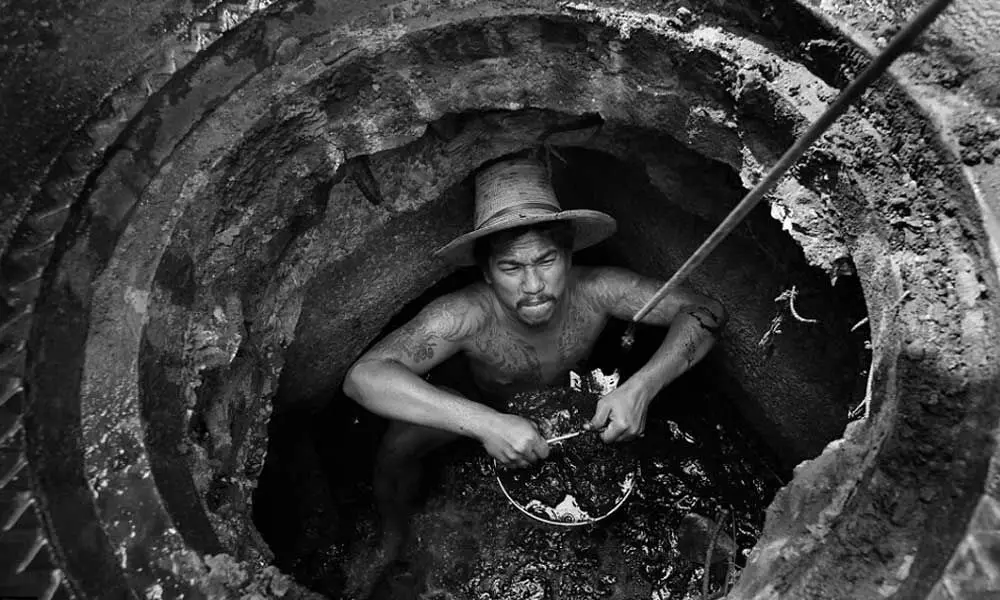Live
- India Faces Blow as Pacer Mohammed Shami Ruled Out for Remainder of Australia Series
- Biden Pardon: Joe Biden Commutes Death Sentences of 37 Inmates, Including Child Killers and Mass Murderers
- South Korea: Yoon believes impeachment trial takes priority over martial law probe
- Strict Action for Non-Adherence to Time Management - DMHO Dr. Swarajya Lakshmi
- Over 13.29 lakh houses approved for rural poor in Maharashtra: Shivraj Chouhan
- District Collector Urges Timely Completion of Indiramma Housing Scheme Survey
- Digital Arrest Scam: Hyderabad Man Duped of ₹7 Lakhs by Fake Crime Branch Police Callers
- Sukhbir Badal seeks President's Police medal for officer who saved his life
- US Firm Accordion Acquires Merilytics, Launches 1,500-Seater Office in Hyderabad
- Free Medical Camp Organized by Alampur Advocate Bar Association
Just In
Manual scavenging: A caste-based discrimination that persists in Pakistan


Officially, Pakistan denies the existence of caste-based practices in the country. But the discrimination and abuse of minorities in the state continues to persist.
Karachi: It's a cultural, traditional inertia of sorts that the descendants of lower-caste Hindus who converted to Christianity centuries ago still find themselves marginalized and subjected to menial labour, including manual scavenging in Pakistan.
Although India has outlawed caste-based discrimination with mixed success, in Pakistan it is almost encouraged by the state, The New York Times reported citing an example where the Pakistani military, last July, had placed newspaper advertisements for sewer sweepers with the caveat that only Christians should apply.
The religious requirement was removed after activists protested against it, NYT said.
But it's a hard reality that municipalities across Pakistan still rely on Christian sweepers. In the sprawling port city of Karachi, sweepers keep the sewer system flowing, using their bare hands to unclog crumbling drainpipes of faeces, plastic bags and hazardous hospital refuse, part of the 1,750 million litres of waste the city's 20 million residents produce daily.
Recounting the story of Jamshed Eric, 40, the newspaper reported that on a recent day he had been hired to clean three sewers for USD 6.
"It is a difficult job," Eric says as he plunges deep below Karachi's streets to clean out clogged sewers with his bare hands, after reciting a little prayer to Jesus to keep him safe.
"In the gutter, I am often surrounded by swarms of cockroaches," he adds.
After a long day, the stench of his work lingers even at home, a constant reminder of his place in life. "When I raise my hand to my mouth to eat, it smells of sewage," he says further.
Like thousands of other lower-caste Hindus, Eric's ancestors converted to Christianity centuries ago, hoping to escape a cycle of discrimination that ruled over every aspect of their lives: what wells of water they could drink from, what jobs they could hold. Manual sewer cleaners, known as sweepers, are at the bottom of that hierarchy, the most untouchable of the untouchable Hindu castes, NYT reported.
But when the Indian subcontinent broke up in 1947 and Pakistan was formed as a homeland for the region's Muslims, a new, informal system of discrimination formed. In Pakistan, Muslims sit at the top of the hierarchy. And as one of Pakistan's small Christian minority, Eric has now been forced into the same work his Hindu ancestors had tried to avoid through religious conversion, the newspaper read.
Eric sends his son to school far from the crowded and segregated neighborhood the city's sewer cleaners live in, hoping to free him of the discrimination that forced him into this work.
While most sweepers like Eric are illiterate, his generation has been more determined to push their children to attend school to break the cycle of discrimination, just as their ancestors tried to do when they converted. But the children still find themselves discriminated against, forced to adopt the profession of their fathers, according to the report.
While Christians make up only 1.6 per cent of Pakistan's population of some 200 million, according to a 1998 government census cited by the Times, rights groups believe they fill about 80 per cent of the sweeper jobs. Lower-caste Hindus mostly fill the rest of the slots.
When Karachi's municipality tried to recruit Muslims to unclog gutters, they refused to get down into the sewers, instead sweeping the streets. The job was left to Christians like Eric, known derogatorily as "choora," or dirty, the newspaper reported.
Mary James Gill, a former parliamentarian from Punjab, who runs the Sweepers are Superheroes advocacy group, has lobbied for years to pressure the government to formally ban manual sewage cleaning work. But most of the sweepers are illiterate and unorganized, she told the Times, which makes it easy for the authorities to pressure them to accept the jobs as their only means of income.
Even doctors often refuse to treat the sweepers, who are seen as unclean and untouchable.
Officially, Pakistan denies the existence of caste-based practices in the country. But the discrimination and abuse of minorities in the state continues to persist.

© 2024 Hyderabad Media House Limited/The Hans India. All rights reserved. Powered by hocalwire.com






